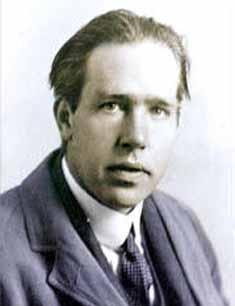|
Niels Bohr was a Danish scientist who won the Nobel Prize for physics
in 1922 for his work in regards to understanding the structure
of atoms. Bohr introduced the theory that electrons travel in
an orbital path around the atom's nucleus. He also theorized that
light could have properties of both a wave and a particle at the
same time.
|
|
 Niels Bohr
Niels Bohr |
Niels Bohr was a professor at the University of Copenhagen and
because of his research others developed theories about quantum
mechanics. Niels Bohr became director of the Institute of Theoretical
Physics in 1920.
In 1943, Niels Bohr escaped being arrested by the German police
and fled to Sweden. He then traveled to the United States where
he worked at the Los Alamos Laboratory in New Mexico on the Manhattan
Project. At the Los Alamos Laboratory Niels Bohr was known as Nicholas
Baker for reasons of security.
Niels Bohr was a consultant on the project and believed the technology
should be shared between nations within the international scientific
community in order to speed up the results. Bohr tried to convince
Winston Churchill of this idea and Churchill opposed it.
After World War II, Niels Bohr returned to Copenhagen and advocated
for the peaceful use of nuclear energy. Bohr was born on October
7, 1885 in Copenhagen, Denmark and died on November 18, 1962. The
element of Bohrium was named in his honor.
Rumor Has It …
Rumor has it that Niels Bohr used to give his little brother atomic
wedgies as a youth. The atomic wedgie ceremonies were thought to
be the springboard for Bohr's later work in atomic energy and complex
theoretical frameworks.
A totally falsified, unsubstantiated and nearly defamatory account
reports that one of Niels Bohr's favorite pastimes was to shave
his dog and teach it to walk backwards.
Written by Kevin Lepton
|

